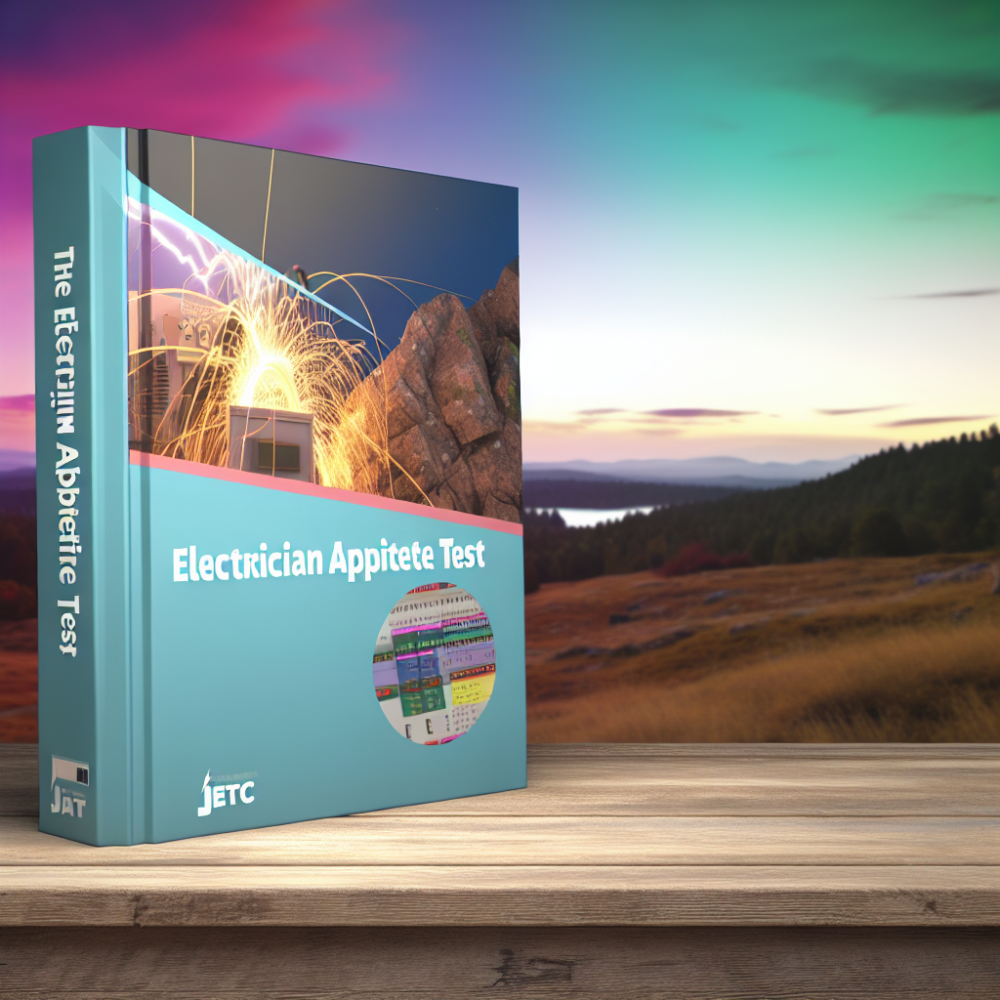Understanding the Electrician Aptitude Test: Key Concepts and Preparation Tips
A Comprehensive Guide to the Electrician Aptitude Test: IBEW, JATC, ETA, and NJATC
Understanding the Electrician Aptitude Test: Key Concepts and Preparation Tips
The electrician aptitude test is a crucial step in the process of becoming a certified electrician. It is designed to assess an individual’s knowledge and skills in various areas related to electrical work. This article aims to provide a comprehensive guide to the electrician aptitude test, focusing on key concepts and preparation tips for four major testing organizations: IBEW, JATC, ETA, and NJATC.
Firstly, it is important to understand the key concepts that are typically covered in the electrician aptitude test. These concepts include electrical theory, electrical circuits, electrical codes and regulations, electrical safety, electrical tools and equipment, and electrical troubleshooting. Familiarizing yourself with these concepts will help you better prepare for the test and increase your chances of success.
To effectively prepare for the electrician aptitude test, it is recommended to start by reviewing the relevant study materials provided by the testing organization. These materials often include textbooks, practice exams, and online resources. It is essential to allocate sufficient time for studying and to create a study schedule that allows for regular and consistent practice.
In addition to studying the provided materials, it is also beneficial to seek out additional resources such as books, online tutorials, and videos that cover the key concepts in more detail. These resources can provide a deeper understanding of the subject matter and help reinforce your knowledge.
Another important aspect of preparing for the electrician aptitude test is practicing with sample questions and mock exams. This allows you to familiarize yourself with the format and types of questions that may be asked. It is recommended to simulate test conditions as closely as possible, including setting a time limit for each practice session. This will help you develop effective time management skills and improve your ability to answer questions within the given time frame.
Furthermore, it is crucial to pay attention to the specific requirements and guidelines provided by the testing organization. This includes understanding the scoring system, the passing criteria, and any specific rules or regulations that need to be followed during the test. Being aware of these details will help you approach the test with confidence and ensure that you meet all the necessary requirements.
Lastly, it is important to maintain a positive mindset and stay focused throughout the preparation process. The electrician aptitude test can be challenging, but with the right mindset and dedication, you can overcome any obstacles. It is essential to stay motivated, set realistic goals, and celebrate small achievements along the way.
In conclusion, the electrician aptitude test is a significant step in becoming a certified electrician. Understanding the key concepts and preparing effectively are crucial for success. By reviewing the provided study materials, seeking additional resources, practicing with sample questions, and following the guidelines provided by the testing organization, you can increase your chances of performing well in the test. Remember to maintain a positive mindset and stay focused throughout the preparation process. Good luck!
Exploring the IBEW Aptitude Test: What to Expect and How to Succeed
A Comprehensive Guide to the Electrician Aptitude Test: IBEW, JATC, ETA, and NJATC
Exploring the IBEW Aptitude Test: What to Expect and How to Succeed
If you’re considering a career as an electrician, chances are you’ll need to take an aptitude test as part of the application process. One of the most common aptitude tests for electricians is administered by the International Brotherhood of Electrical Workers (IBEW). In this section, we will explore what to expect from the IBEW aptitude test and provide tips on how to succeed.
The IBEW aptitude test is designed to assess your knowledge and skills in various areas related to electrical work. It consists of multiple-choice questions that cover topics such as electrical theory, math, reading comprehension, and mechanical reasoning. The test is timed, usually lasting around two to three hours, and is typically administered on a computer.
To succeed in the IBEW aptitude test, it is essential to prepare thoroughly. Start by familiarizing yourself with the topics that will be covered in the test. Review electrical theory concepts, brush up on your math skills, and practice reading and interpreting technical documents. There are numerous study guides and practice tests available online that can help you prepare.
In addition to studying the content, it is crucial to develop effective test-taking strategies. One strategy is to manage your time wisely. Since the test is timed, it is essential to allocate your time appropriately to ensure you have enough time to answer all the questions. Skim through the questions quickly at the beginning to get an idea of what to expect and prioritize the ones you feel most confident about.
Another strategy is to read the questions carefully and pay attention to details. Some questions may include multiple correct answers, but you are only asked to select the best one. Take your time to analyze each option and choose the one that is most accurate or appropriate in the given context.
Furthermore, it is essential to eliminate incorrect options systematically. If you are unsure about a particular question, try to eliminate the options that are obviously incorrect. This will increase your chances of selecting the correct answer even if you are unsure about it.
During the test, it is also crucial to stay calm and focused. Avoid getting stuck on difficult questions and move on to the next one if you are struggling. You can always come back to it later if you have time. Remember to read each question carefully and avoid rushing through the test.
Lastly, practice makes perfect. Take advantage of the practice tests available online to familiarize yourself with the format and types of questions you may encounter. This will help you build confidence and improve your performance on the actual test.
In conclusion, the IBEW aptitude test is an important step in the application process for aspiring electricians. To succeed in the test, it is crucial to prepare thoroughly by studying the content and developing effective test-taking strategies. By managing your time wisely, reading the questions carefully, eliminating incorrect options, and staying calm and focused, you can increase your chances of performing well on the test. Remember to practice regularly to build confidence and improve your performance. Good luck!

A Comprehensive Guide to the Electrician Aptitude Test: IBEW, JATC, ETA, and NJATC
Navigating the JATC Aptitude Test: Essential Information and Study Strategies
The Joint Apprenticeship and Training Committee (JATC) aptitude test is a crucial step in becoming an electrician. It is designed to assess your knowledge and skills in various areas related to the electrical trade. In this section, we will provide you with essential information about the JATC aptitude test and offer study strategies to help you prepare effectively.
First and foremost, it is important to understand the format and content of the JATC aptitude test. The test typically consists of multiple-choice questions that cover a wide range of topics, including electrical theory, math, reading comprehension, and mechanical reasoning. It is essential to familiarize yourself with these areas and ensure you have a solid understanding of the concepts and principles involved.
To prepare for the JATC aptitude test, it is recommended to start studying well in advance. Give yourself enough time to review the material thoroughly and practice answering sample questions. This will help you identify any areas where you may need additional study and allow you to become more comfortable with the test format.
One effective study strategy is to create a study schedule and stick to it. Break down the material into manageable chunks and allocate specific time slots for each topic. This will help you stay organized and ensure that you cover all the necessary content before the test.
Additionally, consider using study guides and practice tests specifically designed for the JATC aptitude test. These resources can provide you with valuable insights into the types of questions you can expect and help you become familiar with the test structure. They can also help you identify any weak areas that require further attention.
When studying for the JATC aptitude test, it is important to focus on understanding the underlying concepts rather than simply memorizing information. This will enable you to apply your knowledge to different scenarios and solve problems effectively. Practice solving problems using real-world examples to enhance your problem-solving skills.
Furthermore, consider forming study groups with fellow aspiring electricians. Collaborating with others can provide a supportive learning environment where you can exchange ideas, discuss challenging topics, and reinforce your understanding of the material. It can also help you stay motivated and accountable.
In addition to studying the technical aspects of the JATC aptitude test, it is crucial to develop good test-taking strategies. Familiarize yourself with the test instructions and format beforehand to avoid any surprises on the day of the exam. Pace yourself during the test and allocate time for each question accordingly. If you encounter a difficult question, don’t get stuck. Move on and come back to it later if time permits.
Finally, remember to take care of yourself during the preparation period. Get enough sleep, eat well, and exercise regularly. Taking care of your physical and mental well-being will help you stay focused and perform at your best during the test.
In conclusion, the JATC aptitude test is a significant hurdle on the path to becoming an electrician. By understanding the format and content of the test, creating a study schedule, utilizing study guides and practice tests, focusing on understanding concepts, forming study groups, and developing good test-taking strategies, you can effectively navigate the JATC aptitude test and increase your chances of success. Remember to take care of yourself throughout the preparation process, and best of luck on your journey to becoming an electrician.
Mastering the ETA Aptitude Test: Tips for Success and Recommended Resources
Mastering the ETA Aptitude Test: Tips for Success and Recommended Resources
The Electrician Aptitude Test (ETA) is an important step in the journey to becoming a certified electrician. It is designed to assess your knowledge and skills in various areas related to electrical work. Whether you are preparing for the ETA as part of the International Brotherhood of Electrical Workers (IBEW), the Joint Apprenticeship and Training Committee (JATC), the Electronics Technicians Association (ETA), or the National Joint Apprenticeship and Training Committee (NJATC), this comprehensive guide will provide you with valuable tips for success and recommend resources to help you prepare.
First and foremost, it is crucial to understand the content and format of the ETA Aptitude Test. The test typically consists of multiple-choice questions that cover a wide range of topics, including electrical theory, electrical codes, electrical safety, electrical calculations, and reading electrical blueprints. Familiarizing yourself with these areas and reviewing the relevant material is essential for success.
To prepare for the ETA Aptitude Test, it is recommended to start by assessing your current knowledge and identifying areas that require improvement. This can be done by taking practice tests or using study guides specifically designed for the ETA Aptitude Test. These resources will help you gauge your strengths and weaknesses, allowing you to focus your efforts on areas that need more attention.
Once you have identified the areas that require improvement, it is time to dive into the study material. There are numerous resources available to help you prepare for the ETA Aptitude Test. Online courses, textbooks, and study guides are all valuable tools that can provide you with the necessary knowledge and practice to succeed. It is important to choose resources that are reputable and up-to-date to ensure that you are studying the most relevant material.
In addition to studying the content, it is also important to develop effective test-taking strategies. Time management is crucial during the ETA Aptitude Test, as you will have a limited amount of time to answer a large number of questions. Practicing timed tests and learning how to pace yourself will help you become more comfortable with the time constraints and improve your overall performance.
Furthermore, it is beneficial to familiarize yourself with the format of the ETA Aptitude Test. Understanding how the questions are structured and what is expected of you will help you approach the test with confidence. Pay attention to the wording of the questions and make sure to read them carefully to avoid any misunderstandings.
Lastly, it is important to stay calm and focused on the day of the ETA Aptitude Test. Getting a good night’s sleep, eating a healthy breakfast, and arriving at the test center early will help you feel prepared and reduce any unnecessary stress. Remember to bring all the necessary materials, such as identification and calculators, and follow any instructions provided by the test administrators.
In conclusion, mastering the ETA Aptitude Test is a crucial step in becoming a certified electrician. By understanding the content and format of the test, assessing your knowledge, and utilizing recommended resources, you can increase your chances of success. Developing effective test-taking strategies and staying calm on the day of the test are also important factors to consider. With dedication and preparation, you can confidently approach the ETA Aptitude Test and take a significant step towards your career as an electrician.
Insider’s Guide to the NJATC Aptitude Test: Important Details and Study Techniques
A Comprehensive Guide to the Electrician Aptitude Test: IBEW, JATC, ETA, and NJATC
Insider’s Guide to the NJATC Aptitude Test: Important Details and Study Techniques
If you’re considering a career as an electrician, you may be required to take an aptitude test as part of the application process. One of the most common aptitude tests for aspiring electricians is the NJATC (National Joint Apprenticeship and Training Committee) test. In this article, we will provide you with important details about the NJATC aptitude test and offer some study techniques to help you prepare.
The NJATC aptitude test is designed to assess your knowledge and skills in areas that are essential for success in the electrical industry. It consists of several sections, including algebra and functions, reading comprehension, mechanical concepts, and spatial relations. Each section is timed, and you will have a limited amount of time to complete each set of questions.
To perform well on the NJATC aptitude test, it is crucial to familiarize yourself with the content and format of the exam. Start by reviewing the topics covered in each section and identifying any areas where you may need additional practice. There are many resources available online, such as practice tests and study guides, that can help you prepare for the exam.
When studying for the algebra and functions section, focus on topics such as equations, inequalities, exponents, and polynomials. Practice solving problems involving these concepts to improve your problem-solving skills. Additionally, familiarize yourself with basic algebraic formulas and equations commonly used in electrical calculations.
The reading comprehension section of the NJATC aptitude test assesses your ability to understand and analyze written information. To improve your reading comprehension skills, practice reading a variety of texts and answering questions based on the content. Pay attention to the main ideas, supporting details, and the author’s tone and purpose. This will help you develop the ability to quickly comprehend and interpret written information.
The mechanical concepts section evaluates your understanding of basic mechanical principles and their application in the electrical field. Study topics such as simple machines, gears, pulleys, and levers. Practice solving problems that involve these concepts to enhance your mechanical reasoning skills.
Spatial relations are crucial for electricians, as they often need to visualize and interpret two-dimensional and three-dimensional diagrams and blueprints. The spatial relations section of the NJATC aptitude test measures your ability to mentally manipulate objects and understand their spatial relationships. To improve your spatial reasoning skills, practice working with puzzles, building models, and interpreting diagrams.
In addition to studying the content of the NJATC aptitude test, it is essential to develop effective test-taking strategies. Start by familiarizing yourself with the format of the exam and the types of questions you can expect. This will help you manage your time effectively and allocate more time to challenging questions.
During the exam, read each question carefully and make sure you understand what is being asked before attempting to answer. If you’re unsure about a particular question, don’t spend too much time on it. Instead, move on to the next question and come back to it later if you have time.
In conclusion, the NJATC aptitude test is an important step in the application process for aspiring electricians. By familiarizing yourself with the content and format of the exam and practicing with sample questions, you can improve your chances of success. Additionally, developing effective test-taking strategies will help you manage your time and approach each question with confidence. Good luck!
Comparing Electrician Aptitude Tests: IBEW, JATC, ETA, and NJATC – Similarities and Differences
When it comes to becoming an electrician, one of the key steps in the process is taking an aptitude test. These tests are designed to assess your knowledge and skills in the field of electrical work, and they are often required by organizations such as the International Brotherhood of Electrical Workers (IBEW), the Joint Apprenticeship and Training Committee (JATC), the Electronics Technicians Association (ETA), and the National Joint Apprenticeship and Training Committee (NJATC). While these tests may have different names and be administered by different organizations, they all serve the same purpose: to determine whether or not you have the necessary skills and knowledge to succeed as an electrician.
One of the main similarities between these aptitude tests is the content that they cover. All of these tests assess your knowledge of electrical theory, electrical systems, and electrical safety. They also test your ability to read and interpret electrical blueprints and schematics, as well as your understanding of electrical codes and regulations. In addition, these tests often include questions that assess your problem-solving skills and your ability to work with tools and equipment commonly used in the electrical trade.
However, there are also some key differences between these aptitude tests. For example, the IBEW aptitude test is specifically designed for individuals who are interested in joining the IBEW as an apprentice electrician. This test consists of multiple-choice questions that cover a wide range of topics, including electrical theory, electrical systems, and electrical safety. The JATC aptitude test, on the other hand, is administered by the JATC and is used to assess the skills and knowledge of individuals who are interested in entering an apprenticeship program. This test also consists of multiple-choice questions, but it may also include hands-on tasks that require you to demonstrate your ability to perform basic electrical tasks.
The ETA aptitude test is designed for individuals who are interested in becoming certified electronics technicians. This test assesses your knowledge of electronics theory, electronic systems, and electronic safety. It also includes questions that test your ability to troubleshoot and repair electronic equipment. The NJATC aptitude test, on the other hand, is specifically designed for individuals who are interested in entering the electrical construction industry. This test assesses your knowledge of electrical theory, electrical systems, and electrical safety, as well as your ability to read and interpret electrical blueprints and schematics.
In conclusion, while the IBEW, JATC, ETA, and NJATC aptitude tests may have different names and be administered by different organizations, they all serve the same purpose: to determine whether or not you have the necessary skills and knowledge to succeed as an electrician. These tests assess your knowledge of electrical theory, electrical systems, and electrical safety, as well as your ability to read and interpret electrical blueprints and schematics. While there are some differences between these tests, such as the specific topics they cover and the types of questions they include, they all play a crucial role in the process of becoming a qualified electrician. So, if you’re considering a career in the electrical trade, be prepared to take an aptitude test as part of the application process.






